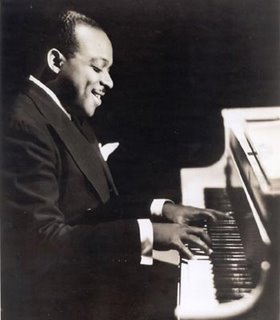The only Count our country ever needed...

To me, the most damning criticism of jazz is that it exists entirely for the benefit of its performers. That is, the enjoyment of the participating musicians is paramount and the enjoyment of the audience is incidental. There is an element of truth to this charge, of course, and there are hundreds of jazz albums—including many considered “great” by jazz’s horrid over-intellectualizers—that are utterly insular and impenetrable to anyone not willing to make a mighty effort. However, these cavils also depend upon a pretty untenable distinction between crowd-pleasing and individual expression. Selling out and wanking, if you want to see it that way. It doesn’t matter: they are not and never have been separate aesthetic categories. Just as ethics has to do with the tensions between collective responsibilities and individual perogative, art gets much of its power from the distance between an audience’s expectations and the artist’s vision. Frustration, fulfillment and all points in between are just part of the experience.
But there are, of course, artists who have a higher fulfillment to frustration ratio. Count Basie is one of these. His music is—to me, at least—pure joy. You never have to meet the Count halfway, he’ll come right up to where you are and start playing some of the best piano you’ve ever heard. His style is immediately accessible and durable enough to be appropriate for everything from a dance party to a romantic dinner to a rainy day to a summer drive to a thoughtful afternoon with a thick book. In his music, I can hear the soundtrack to a lucky life—the passion, the pleasure, the dancing and the drama. It isn’t always exuberant, true, but even when his songs slow down, they never become morose or mopey. A quiet Count Basie is still proud, still sensual, still funky. Roaring or whispering, Basie is all about joie d’vivre.
Part of his appeal, I think, lies in his musical egolessness. Put simply, there is no other great pianist who plays so little. There have been precious few artists so comfortable with their abilities and their collaborators. Even in his early, hungry material, he never imposes his playing onto the songs. He was interested in making everything fit, in making sure that he and his players give an exciting performance, not in proving his genius over and over agin. In doing this—and this is one of the wonderful contradictions of art—he proved it more thoroughly and finally than any thousand flashy moments ever could.
With the Count, however, it can be hard to separate the band from the man. And that band has been home to more great artists than anyone can count. There’s Lester Young, one of the finest tenor players who ever played (and the one great jazz figure ever to come out of Minneapolis, by the way). There’s Jo Jones, the drummer who kept the beat as surely as a miser keeps a thousand dollar bill and an innovator in ways which modern players are still coming to terms with. There’s Freddie Green, a guitarist so modest and subtle that, even when he don’t hear him, you’d miss him if he was gone. And the singers! You can’t do much better than Ella Fitzgerald, of course, but Helen Humes is no second fiddle herself. Plus, I’ve got a big soft spot for wailin’, debonair Joe Williams. My favorite, however, is Jimmy Rushing, Mister Five by Five, who could shout, stomp, and bellow and still keep it all sounding sweet as your best summer day.
But Count Basie was more than the capstone that held all these talents together. He was more like the engine behind their brilliance. He gave them the discipline they needed and the freedom they deserved. The very consistency of the Basie bands, through all the endless line-up changes and shake-ups, proves that their leader was just that, a leader, the person without whom a hundred great gifts and a thousand glorious songs would have been wasted. I’ve read that Count Basie lived in awe of Duke Ellington. He needn’t have. The kind of greatness that they shared does not stand in ranks. The treasure both men left the world shines so brightly that comparisons necessarily become impossible and foolish.

